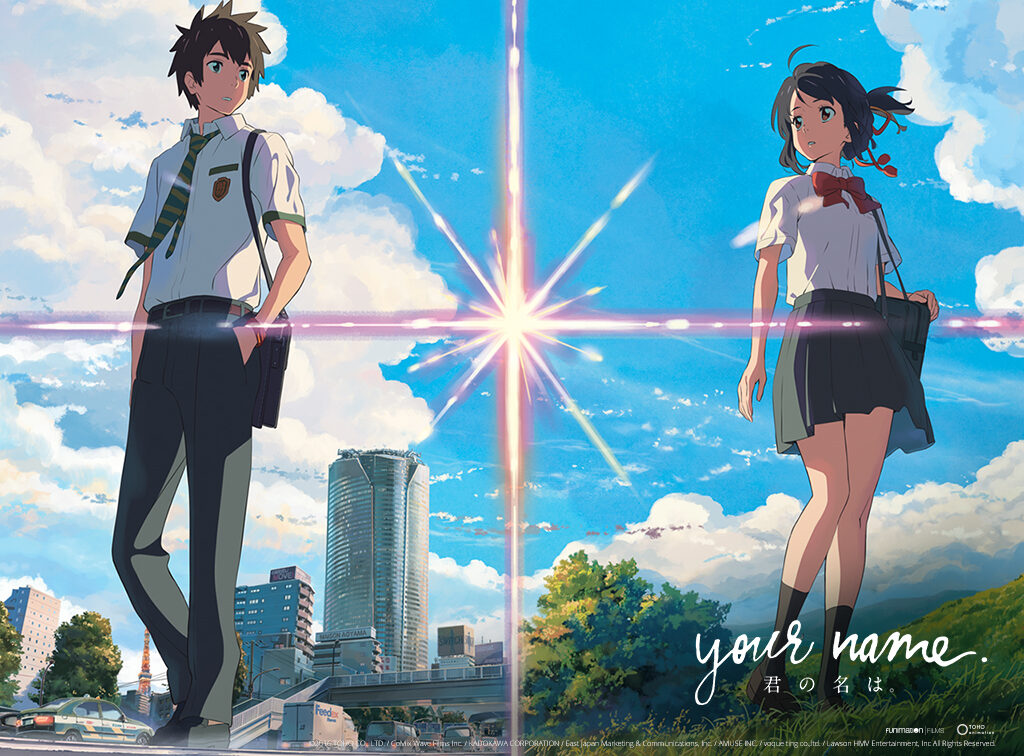Makoto Shinkai has proven himself not just as a jack of all trades, rising up from a self-starter who wrote, animated, and starred in one of his first shorts, but also as one of the premiere anime directors working today often receiving comparisons to Miyazaki. Shinkai himself humbly bats these away, but it is true especially with the success of ‘Your Name’, a critical hit and beloved globally, that Shinkai’s platform continues to rise. With the re-release of Shinkai’s latest film ‘Suzume’ in North American theaters, we thought this would be a perfect time to look at his catalogue and rank them in order. Truly there are no losers in the bunch; however, we do feel there are some of Shinkai’s films that truly outshine the rest.
9. She and Her Cat
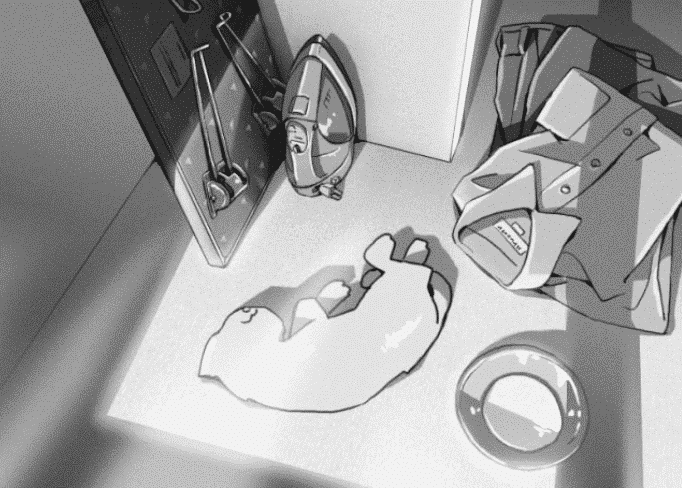
‘She and Her Cat’ is Shinkai’s first work that begins to get him attention, and ultimately led to his 2000 DoGA CG Animation Contest award and his partnership with CoMix Wave Films. Written and animated solely by Shinkai, She and Her Cat tells a story of a girl as seen from the point-of-view of her cat. In this brief story, Shinkai portrays beauty, love, and sorry, all within five minutes time which shows his early potential that would later become more fully realized with his feature films.
8. 5 Centimeters per Second
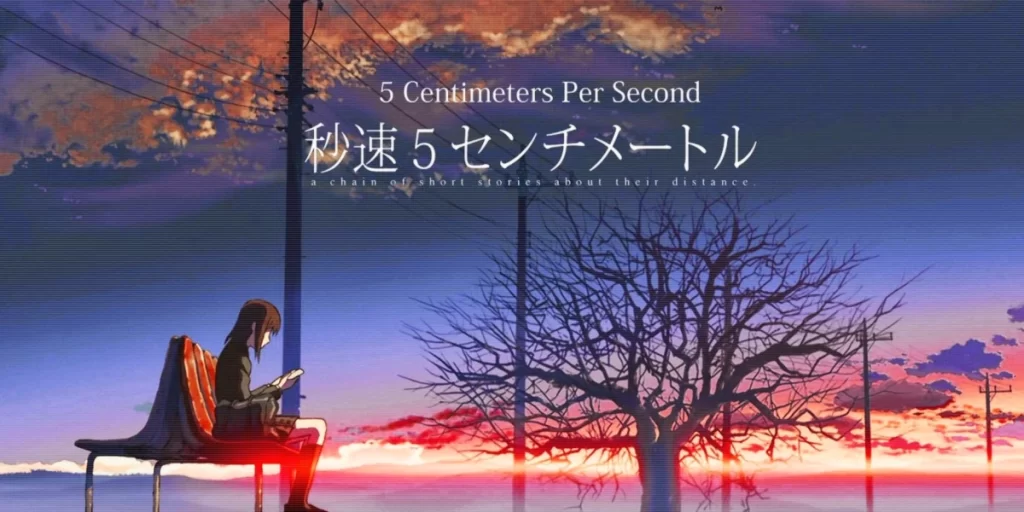
‘5 Centimeters per Second’ likely is one of Shinkai’s most personal films, and perhaps his most melancholic, as it seems to time out around his break-up from his creative and romantic partner Mika Shinohara. (Akari Shinohara is one of the main characters in the film, and may be named after Mika.) Despite this personal origin, or perhaps because of these factors, the film has become rather divisive especially with its conclusion. To the point where the reaction to this film may be why it wasn’t until ‘Your Name’ that Shinkai really captured the zeitgeist again, despite releasing some incredibly strong films in between such as ‘Children Who Chase Lost Voices’ and ‘The Garden of Words’. Still a weak film by Shinkai is still a powerfully moving film that will have you feel so strongly it hurts. 5 Centimeters per Second certainly does that, but just perhaps not as great as films 9 – 1 on this list.
7. Voices of a Distant Star
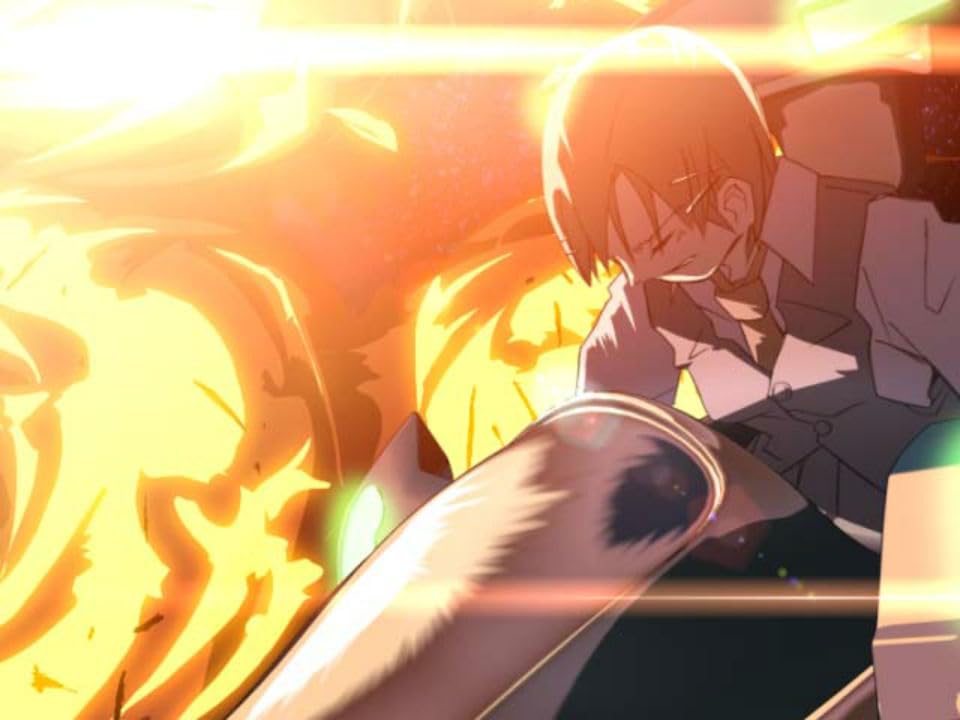
Makoto Shinkai worked as an animator for a game developer, and in his spare time he had begun to make short films such as ‘She and Her Cat’ and ‘Other Worlds’. While they paved the way for Shinkai, ‘Voices of a Distant Star’ is what helped break Shinkai through to the mainstream in Japan and around the world. The film is only 25 minutes long, yet it proved Shinkai’s ability to pack a punch with his stories by combining many of what we recognize now as hallmarks of his films: beautiful art, a powerful story of connections between people, and loss. Though ‘Voices of a Distant Star’ undoubtedly may look antiquated compared to his major budget films, knowing he nearly singlehandedly created this makes it all the more amazing now matter its age.
Read our complete review of ‘Voices of a Distant Star’6. Suzume
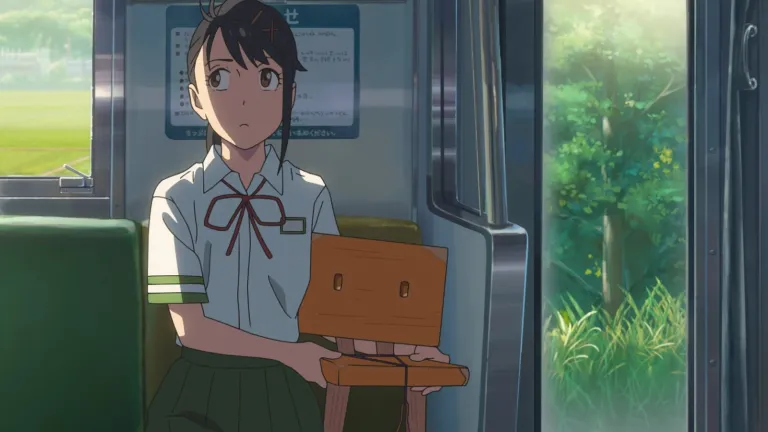
(Source: Crunchyroll)
Suzume tells the story of the titular character who discovers a mysterious door in an abandoned ruin, and after opening it she tries and fails to enter the world she sees on the otherside. Later while in class she sees a mysterious sight rising from where the abandoned site, and she races back and while there discovers a young man named Souta attempting to seal the door. Souta she learns is tasked with keeping the supernatural at bay, and to do so he must lock these doors across Japan. After a mysterious transformation, Suzume and Souta, now with new challenges, work together to fulfill his mission. As Shinkai did with ‘Children Who Chase Lost Voices’, he seems to take inspiration from the work of Miyazaki, but unlike his other film this has more of a Shinkai-aesthetic and feel. We get the zaniness of a mascot-like character, though untraditionally portrayed, and we get the excitement of a real quest as our protagonists traverse the country. Though Shinkai’s portrayal of the connection between the leads feels weaker compared to ‘Your Name’ and ‘Weathering with You’, this is still a strong entry in Shinkai’s canon.
Read our complete review of ‘Suzume’
5. Children Who Chase Lost Voices
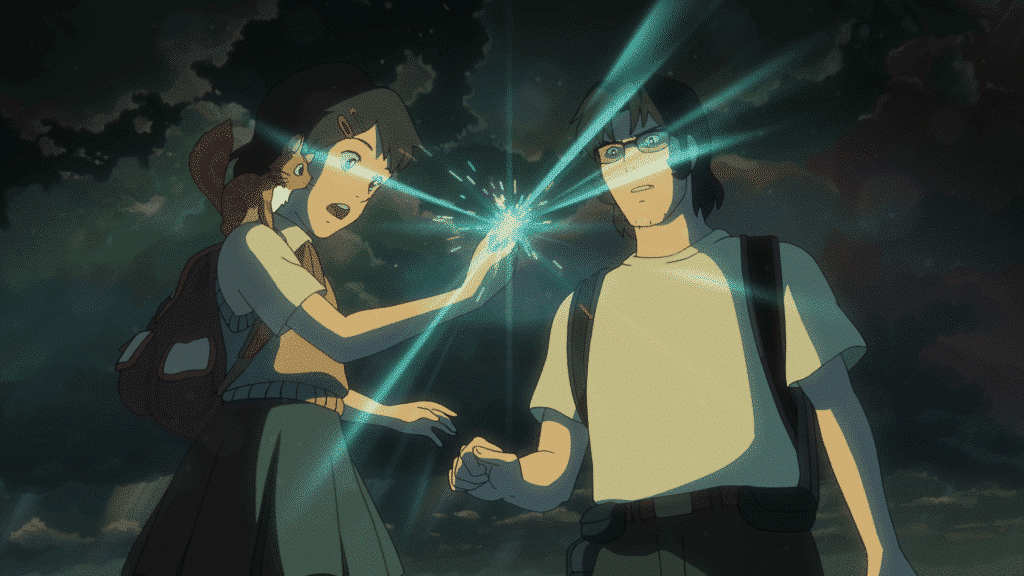
Children Who Chase Lost Voices (Source: GKIDS)
Shinkai received comparisons to Miyazaki early in his career, a comparison he humbly rejects. Still Shinkai does cite Miyazaki as an influence, and on the press tour for Children Who Chase Lost Voices he admits this comparison is understandable when this film is so clearly Shinkai’s own attempt at telling a Miyazaki-like story. The comparisons are clear from the jump as the audience meets a young female protagonist named Asuna, curious and full of adventurous potential, who sets own on a typical hero’s journey after meeting a mysterious young man proclaiming to be from another land. She then joins a small group of characters who set off for this strange world, and there they discover a mysterious people, creatures, and more. If this film had come out after Your Name’s popularity, it would have likely gained significant attention in the U.S. As it did not it’s one of Shinkai’s mid-career films that are too often looked over. Perhaps it’s attempt to be Miyazaki was too much for fans of Shinkai; however, if you look at this film you still see what makes Shinkai’s films so rewarding, and we think it’s certainly upper echelon Shinkai.
Read our complete review of ‘Children Who Chase Lost Voices’
4. The Garden of Words
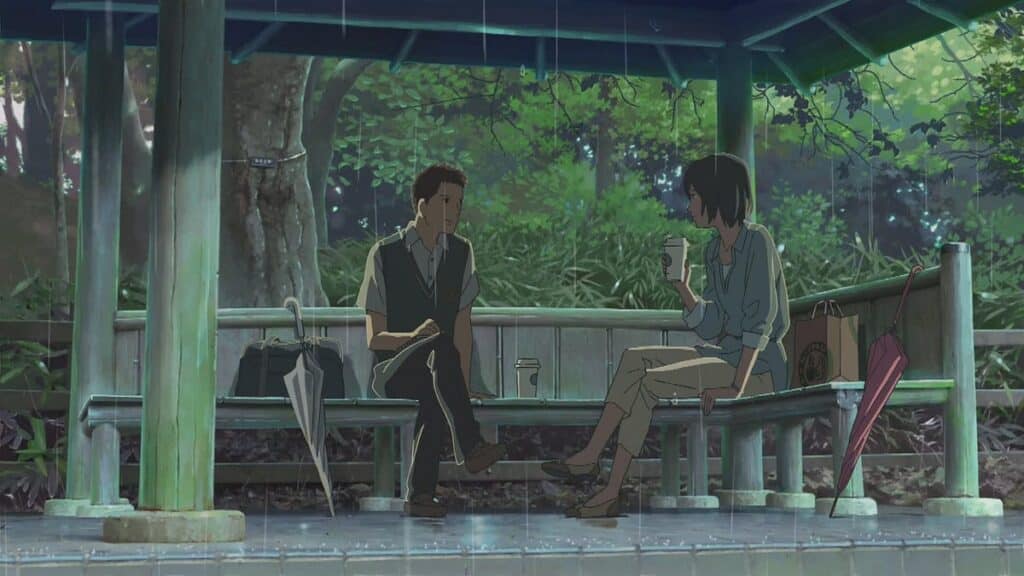
The Garden of Words (CoMix Wave Films)
Shinkai’s first work began with short films such as ‘She and Her Cat’ and ‘Voices of a Distant Star’, and while ‘The Garden of Words’ comes in at 46 minutes, long enough to apparently qualify as a feature, it harkens back to his early days tellingn powerful succinct stories. ‘The Garden of Words’ begins with a young student named Takao Akizuki, who spends his days dreaming of becoming a shoemaker. On one rainy day in a beautiful park in Tokyo, he meets a young woman whose name he does not know. Despite their differences, age, approach to life, and certainly taste in beer and chocolate, the two form a close bond on the rainy days. Shinkai is a master of using small moments to build connections between people, and this mid-career film may have been his best at achieving this at least until ‘Your Name’. It’s no wonder as this film is a perfect bridge between his early work and his work from ‘Your Name’ on. The animation is more intricate, and stunning, than any of his previous works at that time, and the story delivers Shinkai’s melancholy while also presenting a more nuanced story of connection. Though this film is divisive, for reasons we cannot get into without spoilers, it’s one that will stay with you and absolutely earns its place this high on the list.
Read our complete review of ‘The Garden of Words’
3. Weathering with You
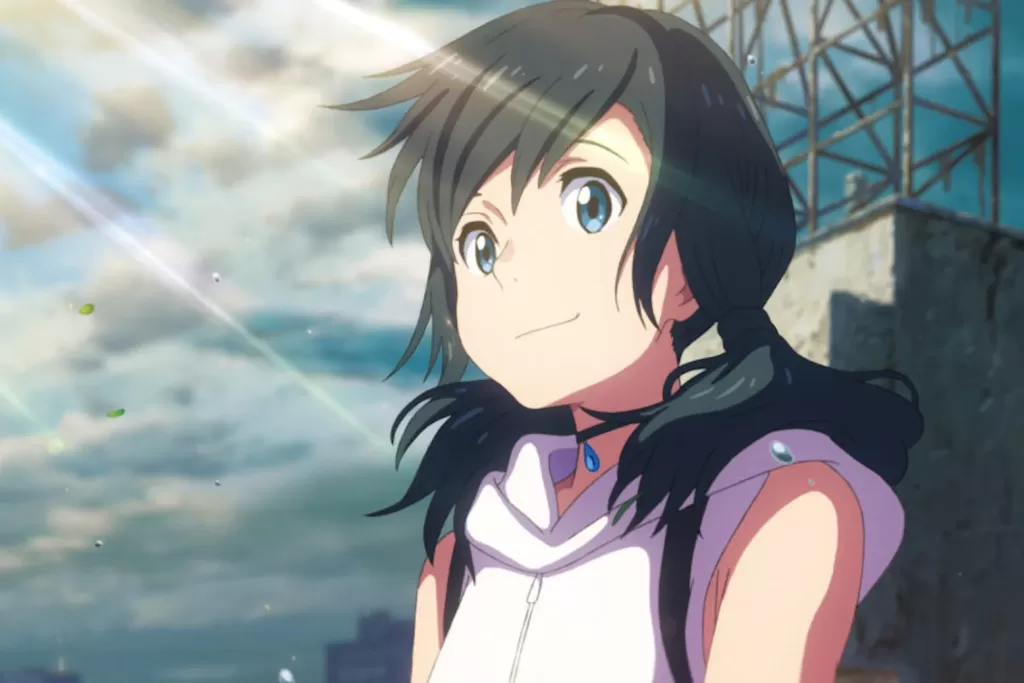
Amano Hina in ‘Weathering with You’ (Source: GKIDS)
‘Weathering with You’ was released a few short years after ‘Your Name’, and is the second in the unofficialy named ‘disaster trilogy’ which also consists of ‘Suzume’. At the start of the film, we’re introduced to Hodaka Morishima, a young high schooler who is trying to escape his life back home by heading to Tokyo. Once there Hodaka struggles with life in the new city, staying homeless for a time, before he finds a job and meets a girl named Nagi. Nagi he learns is a sunshine girl, which means she can use her powers to bring sun and clear skies on a rainy day, and together they work to deliver this joy for many who request Nagi’s services. However like with the sky life can’t always be sunny, and soon they encounter complications that threaten to split them apart.
Just as Shinkai’s ‘The Garden of Words’ pushed his work forward, both visually and with his writing, ‘Weathering with You’ continues that leap forward following ‘Your Name’s success. With this film, Shinkai knew he wanted to touch on a story about climate, climate change, and societal issues; however, he wanted to keep these young protagonists at the center as the heart of it all. In doing so, Shinkai puts his protagonists in positions familiar to his tropes and unfamiliar, with the latter coming through in particular as the stakes are significantly raised for Hodaka after an encounter with some bullies and the cops. In many ways, this is Shinkai’s most mature film, and as a push forward, and an incredibly entertaining viewing experience, it’s certainly one of Shinkai’s best.
Read our complete review of ‘Weathering with You’
2. The Place Promised in Our Early Days
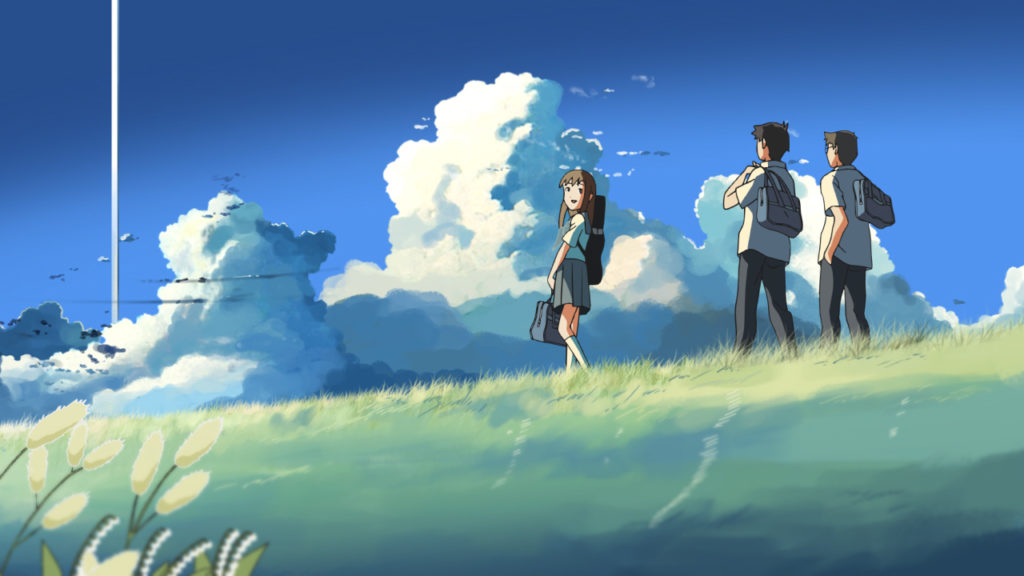
Following the success of ‘Voices of a Distant Star’, Makoto Shinkai set out to make his first feature film ‘The Place Promised in Our Early Days’, which revisiting now it’s clear how much of Shinkai’s work to come this film prefaces. In the movie, we’re introduced to an alternate version of our world, where Japan has been halved with the Union controlling the other half. Hiroki Fujisawa and Takuya Shirakawa, best friends since ninth grade, have become fascinated by a mysterious tower built in Union territory, and they plan to rebuild a crashed plane to fly there one day. As the work on the plane they also befriend Sayuri Sawatari, and together they enjoy their youth, discuss future plans, and continually work on their dream of one day reaching Hokkaido Tower. That is until Sayuri disappears.
Shinkai’s trademark touches are clear from the jump, with the beautiful scenes of the Japanese countryside, and Tokyo, paired with youthful friendship and loss. Shinkai goes on to explore memory, connections over distances, and he does so while leaning into the sci-fi elements of this world as well. Shinkai goes back and forth between fantasy and sci-fi; however, his films always have an otherworldly quality. Though this film has been surpassed by ‘Your Name’, and for others they may hold it in less esteem as an admirable early work but not one of his best, I couldn’t picture it going anywhere else on this list but #2.
1. Your Name
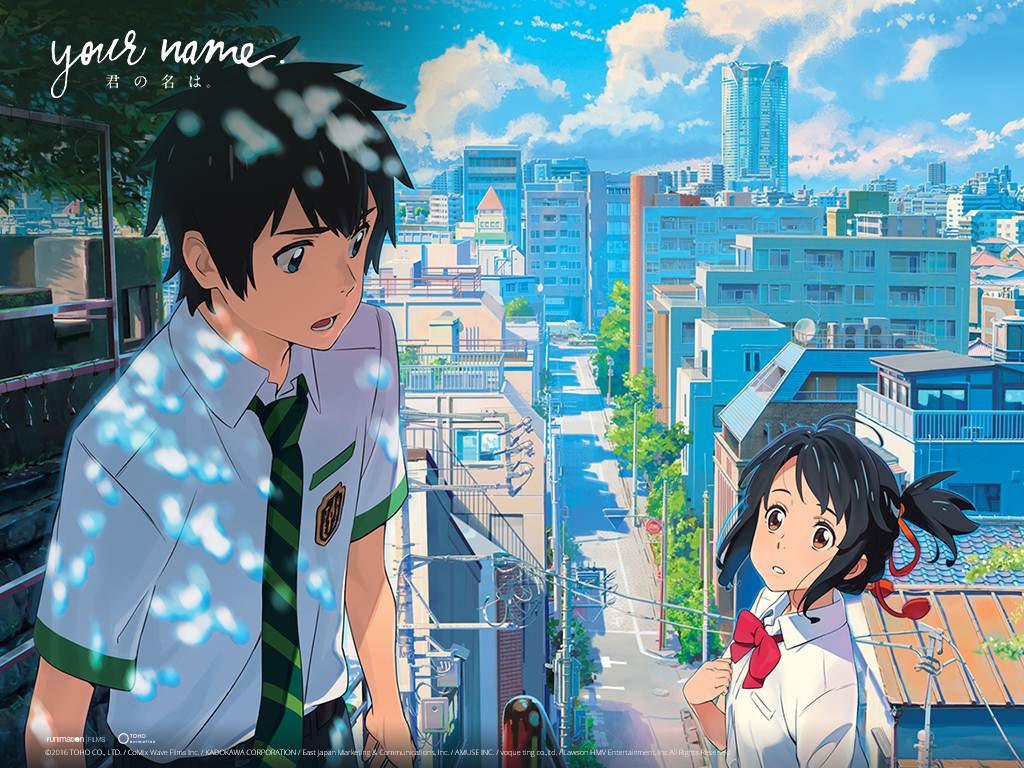
Makoto Shinkai’s ‘Your Name’ (Source: Funimation)
‘Your Name’ tells the story of Taki Tachibana and Mitsuha Miyamizu, the former a young high school boy from Tokyo and the latter a high school girl from the rural town of Itamori. Mitsuha in particular, though arguably both of them, are seeking more in life, and one day after she makes a wish to become a young boy in Tokyo she wakes up in Taki’s body. She thinks she’s in a dream going about someone else’s life, until she realizes that Taki had the same experience only in her body. Taki and Mitsuha both try to understand their new predicament, which draws them ever closer together even as they are miles apart.
As we wrote in our review, Shinkai’s ‘Your Name’ appears to be the union of all of his best attributes as a creator coming together. Shinkai uses some of his sharpest tools to discuss the importance of connection, memory, and love. He does this while perfectly presenting two seperate lives, with characters that feel lived in. He also is able to use the trope of body switching, a go-to for manga and anime creators looking to tell insular stories, to its greatest effect. ‘Your Name’ is also the perfect example of how a story, full of specifity for Japan and Japanese traditions, can still tell a story so universally beautiful and powerful. This isn’t even highlighting much of the film we cannot spoil, as Shinkai also discusses much broader issues too that are more world focused than character focused, even as he uses the characters to center those points. It’s no surprise why ‘Your Name’ became such a global hit, and it certainly deserves recognition of first place on this list.
Read our complete review of ‘Your Name’
What are your thoughts? Let us know in the comments which is your favorite Makoto Shinkai and how you would have ranked this list differently?
